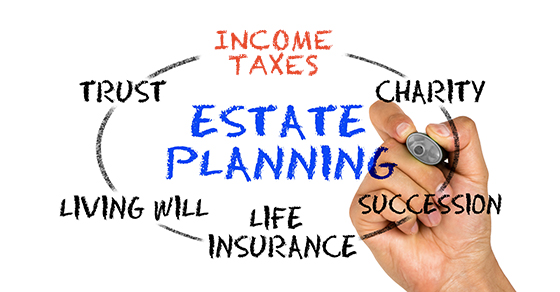With the current federal estate tax exemption soaring to $13.61 million in 2024, many individuals may feel reassured that their estates will escape estate taxes altogether. This significant increase has shifted the focus of estate planning discussions towards income tax considerations for heirs.

While estate tax concerns may seem less pressing, it's crucial to recognize that the higher exemption amount is set to revert to $5 million, adjusted for inflation, after 2025, unless legislative changes intervene. This impending adjustment underscores the importance of proactive planning now, not only to optimize income tax savings for beneficiaries, but also to strategically manage assets in light of potential future tax scenarios.
Here, we explore strategies aimed at leveraging the current estate landscape, emphasizing the intersection of estate planning with income tax minimization for future financial security.
Important: As mentioned above, keep in mind that the federal estate tax exclusion amount is scheduled to sunset at the end of 2025. Beginning on January 1, 2026, the amount is due to be reduced to $5 million, adjusted for inflation. Of course, Congress could act to extend the higher amount or institute a new amount.
Here are some strategies to consider in light of the current large exemption amount.
Using the annual exclusion
One of the benefits of using the gift tax annual exclusion to make transfers during your lifetime is to save estate tax. This is because both the transferred assets and any post-transfer appreciation generated by those assets are removed from your (the donor’s) estate.
As mentioned, estate tax savings may not be an issue because of the large exemption amount. Further, making an annual exclusion transfer of appreciated property carries a potential income tax cost because the recipient receives your basis upon transfer. Thus, the recipient could face income tax, in the form of capital gains tax, on the sale of the gifted property in the future. If there’s no concern that an estate will be subject to estate tax, even if the gifted property grows in value, then you might want to base the decision to make a gift on other factors.
For example, gifts may be made to help a relative buy a home or start a business. But a donor shouldn’t gift appreciated property because of the capital gains that could be realized on a future sale by the recipient. If the appreciated property is held until the donor’s death, under current law, the heir will get a step-up in basis that will wipe out the capital gains tax on any pre-death appreciation in the property’s value.
Spouses now have more flexibility
Years ago, spouses often undertook complicated strategies to equalize their estates so that each could take advantage of the estate tax exemption amount. In many cases, a two-trust plan was established to minimize estate tax. “Portability,” or the ability to apply the decedent’s unused exclusion amount to the surviving spouse’s transfers during life and at death, became effective for estates of decedents dying after 2010. As long as the election is made, portability allows the surviving spouse to apply the unused portion of a decedent’s applicable exclusion amount (the deceased spousal unused exclusion amount) as calculated in the year of the decedent’s death. The portability election gives married couples more flexibility in deciding how to use their exclusion amounts.
Valuation discounts
Be aware that it may no longer be worth pursuing some estate exclusion or valuation discount strategies to avoid inclusion of property in an estate. It may be better to have the property included in the estate or not qualify for valuation discounts so that the property receives a step-up in basis. For example, the special use valuation — the valuation of qualified real property used for farming or in a business, based on the property’s actual use rather than on its highest and best use — may not save enough, or any, estate tax to justify giving up the step-up in basis that would otherwise occur for the property.
For personalized advice on navigating estate planning or income tax saving strategies, please contact your Rudler, PSC advisor at 859-331-1717.
RUDLER, PSC CPAs and Business Advisors
This week's Rudler Review is presented by Josh Myers, Staff Accountant and Becca Thorman, CPA, CVA.
If you would like to discuss your particular situation, contact Josh or Becca at 859-331-1717.


As part of Rudler, PSC's commitment to true proactive client partnerships, we have encouraged our professionals to specialize in their areas of interest, providing clients with specialized knowledge and strategic relationships. Be sure to receive future Rudler Reviews for advice from our experts, sign up today !